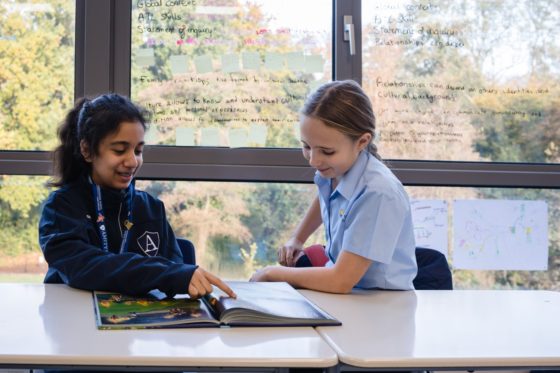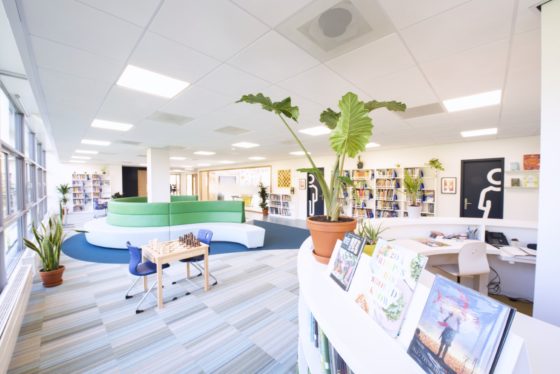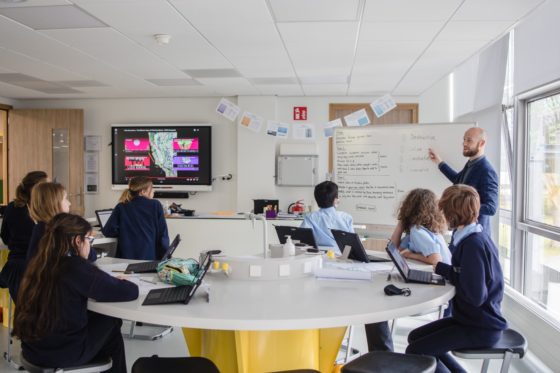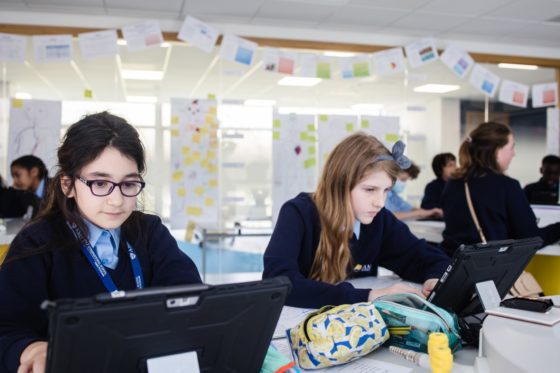Partner content
Amity International’s senior school awarded IB accreditation


It’s been a difficult couple of years for schools around the world, but Amity International School Amsterdam is in a celebratory mood. The school, teaching students aged 3-16 on a tree-filled campus in Amstelveen, has just been awarded official International Baccalaureate (IB) accreditation for its Middle Years Programme (MYP).
The IB is the curriculum framework (in English) followed by all 11-16 year-olds who attend its state-of-the-art senior school, which opened in 2019. Neville Kirton, Head of the Senior School, is delighted with the result, describing the accreditation as ‘the culmination of two years of hard work’ and ‘a tremendous achievement for the whole community.’ ‘It feels especially satisfying to accomplish this under the circumstances,’ he added.
The school was encouraged by the positive comments made by the IB authorisation team, who commended the ‘stimulating learning environment based on understanding and respect’ that the school had built. Inspectors stated that students demonstrated ‘a wide understanding of, and commitment to, the MYP’.

Applied learning
Mr Kirton, who had taught GCSEs and A-levels in the UK, and IB (MY and Diploma) programmes in Colombia, before taking up his post at Amity Amsterdam, has been impressed with the MYP’s ‘more three-dimensional’ approach. ‘There’s a shift from thinking about surface level learning to deeper, conceptual learning,’ he says.
Knowledge is not taught in isolation, but contextualised and applied to real-life situations. The children are encouraged to make connections between things. In Biology, for example, students have been looking at how the body works as a system. They understand how a micro change can have a macro effect and they have been transferring these insights from one medical disease to another.
The whole child
Nurturing 10 key attributes in its students, including being inquiring, caring and open-minded, the MYP provides a more holistic education. ‘It’s about the whole child,’ explains Mr Kirton. ‘It empowers each individual to thrive.’
Children are encouraged to develop meta-cognitive skills, reflect on their work and actively seek feedback. Assessments are seen as an opportunities for authentic learning in real world situations. The self-chosen MYP projects, for example, develop research and organisational skills and help to create autonomous learners.

Preparation for the future
The programme, which at Amity Amsterdam is taught across 10 subjects such as Creative Arts, Sciences and Mathematics, is also about equipping students with the skills they need to become good citizens and to best serve the planet’s future needs. ‘International-mindedness and respecting diversity is at the heart of the IB,’ explains Mr Kirton. The IB teaches students to think ‘on a more global level’ about the challenges society faces, he says, ‘but also equips them with the values and skills they need to address those challenges.’
Asked what kind of young people the school creates, Amity’s MYP3 and MYP4 students said they were ‘developing lots of life skills’, and described Amity students as ‘well-rounded’, ‘cultured’ (due to the diverse student population) and with ‘a strong work ethos’. Others mentioned how safe they felt within the community, saying they ‘don’t feel judged’, had high self-confidence and appreciated the school values of respect and responsibility.
Vertical tutoring
One way in which Amity ensures that students feel safe and supported in the senior school is the use of vertical tutoring, where students of different ages − but part of the same ‘House’ − come together as a tutor group. Older students act as mentors and role-models for the younger ones, which develops their own sense of responsibility and reduces the risk of bullying.
‘It helps to build those relationships for learning and creates trust and respect amongst the students,’ says Mr Kirton. Also popular with parents is the buddy system, which pairs newcomers with a mentor of a similar age so that they feel at home as quickly as possible.

Family atmosphere
With just 320 students across the whole school and small class sizes (capped at 24, but averaging 18), the school has a friendly, family atmosphere. ‘Many students feel like a big fish in a small pond, rather than being lost in a larger system,’ says Mr Kirton. ‘The environment itself lends itself to a close, positive community,’ he adds. ‘We’ve got lots of open spaces that we encourage students to use between their lessons.’
The senior school’s rich co-curricular offer also helps students find their place. There are music concerts and annual theatrical productions, for example, as well as a student council. Developing digital literacy is also high on the agenda, with a laptop programme available for all senior school students.
Next up: the IB Diploma Programme
Amity Amsterdam might be celebrating the recent MYP accreditation, but it will not be resting on its laurels. ‘This is a launch pad for us to continue to grow and develop further,’ says Mr Kirton. ‘There are so many elements of the IB philosophy that we can now take to the next level.’
With both the Primary and Middle Years programmes now in the bag, the school is in a position to seek accreditation for the IB Diploma Programme, a two-year programme offered to students aged 16-18, giving them the qualifications required to make a university application. Amity Amsterdam hopes to offer the Diploma Programme from August 2022, when celebrations will begin anew.
You can find out more about Amity’s Middle Years Programme here, or contact Admissions to arrange a visit.
Thank you for donating to DutchNews.nl.
We could not provide the Dutch News service, and keep it free of charge, without the generous support of our readers. Your donations allow us to report on issues you tell us matter, and provide you with a summary of the most important Dutch news each day.
Make a donation